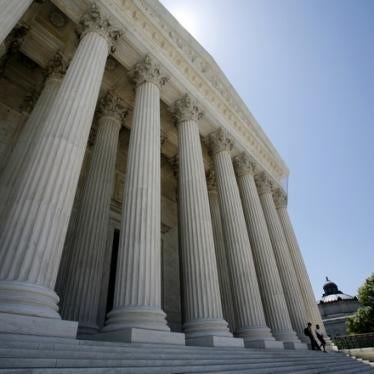Ellen F. Rosenblum, Attorney General
Oregon Department of Justice
1162 Court Street, NE
Salem, OR 97301-4096
May 24, 2021
Sent via email and FedEx
Dear Attorney General Rosenblum:
Thank you for responding to our letter calling on you to withdraw your opposition to retroactive application of the decision in Ramos v. Louisiana, finding non-unanimous jury convictions unconstitutional.[1] We appreciate that you express your agreement with us that Ramos is a “welcome ruling” and that you share our concerns about the racial disparities in our criminal legal system toward which Oregon’s non-unanimous jury system has contributed.
We again ask you to back up these statements of values with actions to achieve justice—not just for those whose convictions the Ramos decision explicitly reversed, but for all who have suffered the wrongful and discriminatory impacts of the long-standing unconstitutional rule.
In your response, you point out that you lack the authority to reverse convictions that are already final. We agree that the decision to reverse belongs to the courts. However, your office has aggressively opposed petitions to reverse older convictions, when you have discretion to choose not to fight retroactivity and to agree to let the Ramos claims proceed. You claim to rely on a duty owed to victims. But victims are not well served by convictions obtained through unfair and unconstitutional procedures. It is ultimately up to the prosecutor to make litigation decisions.
In Louisiana, the only other state with a similar rule, Orleans Parish District Attorney Jason Williams has used his discretion to agree to rehearing cases with convictions obtained through non-unanimous juries dating back to 1974, including many whose appeals are already final.[2] His civil rights division chief called this action “a slow process to restore the confidence of all the citizens of New Orleans that our courts are applying equal justice.”[3] While Oregon may have different rules, we suspect that you have the same discretion to withdraw your opposition to retroactivity and allow the claims to proceed. Doing so would help restore the confidence of all citizens in Oregon in the fairness of the system.
The argument that you are simply waiting on the decision of the Supreme Court as to whether Ramos will apply retroactively is inconsistent with your filing of an amicus brief opposing retroactivity in the case Edwards v. Vannoy.[4] You correctly chose not to defend Oregon’s gay marriage ban because it violated constitutional rights.[5] The same principle applies here. Truly welcoming the Ramos decision and combatting racial discrimination in the system, would have meant filing a brief advocating for retroactivity instead of opposing it.
The Supreme Court’s recent ruling in Edwards, holding that federal law does not require retroactivity, does not change your moral or legal obligation to treat all people convicted by non-unanimous juries fairly, regardless of when that conviction occurred.[6] The Court made clear that states are free to retroactively apply the jury-unanimity rule in post-conviction proceedings.[7]
The non-unanimous jury rule has been a stain on Oregon’s criminal legal system. Just as you have taken leadership in championing decriminalization of drug possession laws, we ask you to change course and use the powers you do have to help right the wrongs against all people of the discriminatory non-unanimous jury rule.
Sincerely,
John Raphling
Senior Researcher, US Program
Human Rights Watch
[1] Ramos v. Louisiana, United States Supreme Court, Case No. 18–5924, April 20, 2020, https://supreme.justia.com/cases/federal/us/590/18-5924/ (accessed May 24, 2021).
[2] Matt Sledge, “New Orleans DA Jason Williams granting new trials to 22 convicted by split juries,” Times-Picayune, February 26, 2021, https://www.nola.com/news/courts/article_b3545d42-784d-11eb-9e12-8fb36f86a313.html (accessed May 24, 2021).
[3] Ibid.
[4] Ellen F. Rosenblum, Attorney General of Oregon, “Brief of Amicus Curiae State of Oregon in Support of Respondent,” Edwards v. Vannoy, https://www.supremecourt.gov/DocketPDF/19/19-5807/156862/20201005160248123_19-5807%20bsac%20State%20Of%20Oregon.pdf (accessed May 24, 2021).
[5] Jeff Mapes, “Gay marriage advocates have bid day as Oregon AG Ellen Rosenblum says ‘no rational basis’ for ban,” Oregonian, February 20, 2014, https://www.oregonlive.com/mapes/2014/02/gay_marriage_advocates_have_bi.html (accessed May 24, 2021).
[6] Edwards v. Vannoy, United States Supreme Court, Case No. 19–5807, May 17, 2021, https://www.supremecourt.gov/opinions/20pdf/19-5807_086c.pdf (accessed May 24, 2021).
[7] Ibid., at footnote 6.








